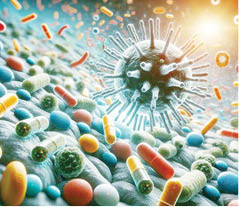Mashood Lawal’s ordeal began when he was diagnosed of kidney stone in 2020 and a stent was placed in his urinary tract.
He fell sick again , and the course of antibiotics he was given didn’t work. He was thereafter misdiagnosed with typhoid and malaria.
This continued till he was finally correctly diagnosed of a drug resistant infection.
Lawal, who is also a pharmacist and a member of the World Health Organisation ( WHO) Taskforce of Antimicrobial Resistance ( AMR) Survivors , explained that the various antibiotics he was prescribed were ineffective against the infection as the symptoms kept coming back.
- FHA halts construction activities in Gwarinpa, other estates in Abuja
- Nigeria, Brazil sign MOU to boost agribusiness
While he was still batting the condition , he got infected with COVID-19.
“I was admitted in the hospital and administered several courses of expensive injectable antibiotics. But the infection persisted even after I survived COVID-19 and was discharged from the hospital,” he said.
While describing his experience as horrifying, he added that the infection was finally resolved after a course of a reserve antibiotic.
Another AMR survivor, who simply wants to be identified as Ade, said he had E. coli and didn’t feel better with the several courses of antibiotics prescribed for him by his doctor. He said this include amoxicillin and ciprotab.
E.coli is a form of bacteria that normally lives in the intestines of people and animals. Most strains of it are harmless but certain types can cause an intestinal infection and potentially life threatening complications.
He said he was able to get better over time but added that doctors ‘could also help by requesting blood culture test soon enough to know, which antimicrobials the infection is sensitive to.
As Nigeria joins the rest of the world to mark this year’s World Antimicrobial Resistance Awareness Week (WAAW), experts have enjoined Nigerians not to misuse or overuse antimicrobials in order to reduce the emergence and spread of Antimicrobial Resistance (AMR) in the country.The theme of this year’s commemoration of the World AMR Awareness Week is “Educate. Advocate. Act Now.”
They described AMR as a global public health and development threat.
The experts also harped on the need for urgent, coordinated action against the threat.
AMR puts many of the gains of modern medicine at risk. It makes infections increasingly difficult or impossible to treat, and makes other medical procedures and treatments – such as surgery, caesarean sections and cancer chemotherapy – much riskier. It turns minor injuries, routine surgeries, or common infections into life-threatening situations,increasing the risk of disease spread, severe illness, disability and death.
AMR occurs when bacteria, viruses, fungi and parasites no longer respond to antimicrobial medicines.
Antimicrobials usually called drugs or medicines are substances used to treat, kill or stop a wide variety of infectious diseases in humans and animals such as antibiotics, antivirals, antifungal and antiparasitic.
Antibiotics treat infections caused by bacteria. Antivirals treat infections caused by viruses such as HIV. Antiparasitic treat infections caused by parasites such as malaria, and antifungals are used to treat infections caused by fungi such as yeast infections.
“Many of the life-saving drugs are dangerously losing their efficacy, which has devastating impacts not only on human health but also on livestock and the economy at large,” said WOAH Director General, Dr Emmanuelle Soubeyran.
The WHO says the misuse and overuse of antimicrobials in humans, animals and plants is one of the main drivers of AMR.
According to the Nigeria Centre for Disease Control (NCDC) antibiotics, for instance, are widely used for the treatment of infections in humans and animals, however, the misuse of antibiotics leads to AMR.
Dr Tochi Okwor, Antimicrobial Resistance ( AMR) lead, NCDC said the drivers of AMR in Nigeria include: Poor levels of AMR awareness among health workers, policy makers, and the general public, driven by overuse and misuse of antibiotics.
“Taking antibiotics when they’re not needed, buying antibiotics without a prescription, using too many antibiotics in farming.”
She also said other drivers are poor hygiene and sanitation in community, health facilities, farms, abattoirs, and limited surveillance systems for tracking.
Impact of AMR
The loss of Antimicrobials’ efficacy has devastating impacts on human health, livestock and the economy.
Data from the NCDC showed that AMR kills more people than malaria, HIV & TB.
“In Nigeria, 64,500 deaths attributable to AMR and 263,400 deaths associated to AMR, “ Dr Okwor, said.
Laxmikant Chavan, technical officer, AMR and coordinator – One Health, WHO Nigeria, explained that during Nigeria’s outbreak of diphtheria, tests revealed that at least two to three antibiotics were not working against the disease.
What all stakeholders can do
Experts said the public and all stakeholders across health, animal and environment sectors have a role to play.
They also said that appropriate or rational use of medicines is one of the ways people can help safeguard the effectiveness of treatment. Life-saving medicines could be kept working when people only take antibiotics when prescribed, and do not self-medicate.
WHO said some ways that everyone including the public , doctors , veterinarians, farmers, veterinarians among others can help stop antimicrobial resistance include, keeping your hands clean and only take antibiotics when prescribed.
“When a patient requires antibiotics, the benefits often outweigh the risks associated with side effects or antibiotic resistance. However, when they are unnecessary, they offer no benefit while posing risks, and their use contributes to the emergence and spread of antimicrobial resistance,” said Dr Silvia Bertagnolio, WHO Unit Head for Surveillance, Evidence and Laboratory Strengthening, Division for AMR.
Dr Matshidiso Moeti, WHO Regional Director for Africa said, “AMR is not only a medical challenge, but rather a complex, multi-faceted burden that demands a whole-of-society response. Africa’s health systems and economies cannot afford the cost of inaction, but with collaboration, it is possible to effectively mitigate the impact of AMR, and protect public health across the region.”
Dr Casmir Ifeanyi, the President of the Association of Medical Laboratory Scientists of Nigeria, said a study carried out a few years ago on an estuary in the country showed that high levels of antimicrobial agents were found in crabs and other crustaceans.
Ifeanyi said this is an example of how huge the burden of AMR is and underscores the need for heightened public awareness, improved regulation of antimicrobials in all sectors.
He also called for the integration of training including for medical laboratory practitioners in the policies for AMR in the country.
He also added that patent medicine vendors should be stopped from stocking and vending antibiotics.
Pharmacists Ifeyinwa George of DRASA Health Trust said multisectoral involvement is key in ensuring sustainability and scalability of AMR mitigation and containment efforts
She said, “ Lets get involved and drive the conversations that address AMR within our communities, states, country and continent.And as we think through viable AMR awareness campaign ideas, let’s think One Health.”
The Director General of NCDC, Dr Jide Idris said the organisation ensures that Nigeria’s response is both strong and effective working hand-in-hand with counterparts from human health, animal health, and environmental sectors under the One Health approach, raising antimicrobial resistance (AMR) awareness, education, understanding, and behaviour change among all relevant stakeholders, among others.
In line with the Global Action Plan on AMR, Nigeria has developed two National Action Plans in the last eight years.
The Coordinating Minister of Health and Social Welfare, Prof Muhammad Ali Pate said the launch of the National Action Plan on Antimicrobial Resistance (AMR) 2.0. came at a time when the global community, through platforms like the 2024 United Nations General Assembly (UNGA), had committed to renewed and urgent action against AMR.
This article is produced for the Media-EIS Fellowship Program, a collaborative partnership among the Nigeria Centre for Disease Control and Prevention, the USAID funded Breakthrough ACTION Nigeria and the African Field Epidemiology Network

 Join Daily Trust WhatsApp Community For Quick Access To News and Happenings Around You.
Join Daily Trust WhatsApp Community For Quick Access To News and Happenings Around You.


